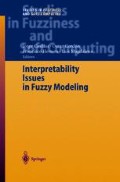Abstract
This chapter addresses rule base complexity in fuzzy models obtained from data. Data-driven fuzzy modeling is introduced, and two main approaches to complexity reduction in fuzzy rule-based models are presented: Similarity-driven rule base simplification, and rule reduction with orthogonal transforms.
Access this chapter
Tax calculation will be finalised at checkout
Purchases are for personal use only
Preview
Unable to display preview. Download preview PDF.
References
M. Setnes, R. Babuška, and H. B. Verbruggen. Rule-based modeling: Precision and transparency. IEEE Trans. Systems, Man and Cybernetics — Part C: Applications and Reviews, 28(1):165–169, 1998.
J. Valente de Oliveira. Semantic constraints for membership function optimization. IEEE Trans. Systems, Man and Cybernetics — Part A: Systems and Humans, 29(1):128–138, 1999.
T. Takagi and M. Sugeno. Fuzzy identification of systems and its applications to modelling and control. IEEE Trans. Systems, Man, and Cybernetics, 15:116–132, 1985.
J. Yen, L. Wang, and C.W. Gillespie. Improving the interpretability of TSK fuzzy models by combining global learning and local learning. IEEE Trans. Fuzzy Systems, 6(4):530–537, 1998.
M. Setnes. Complexity reduction in fuzzy systems. Ph.D. Thesis, Delft University of Technology, Dep. of El. Eng., Control Laboratory, Delft, the Netherlands, February 2001.
M. Setnes, R. Babuška, U. Kaymak, and H. R. van Nauta Lemke. Similarity measures in fuzzy rule base simplification. IEEE Trans. Systems, Man and Cybernetics — Part B: Cybernetics, 28(3):376–386, 1998.
R. Babuka. Fuzzy Modeling for Control. Kluwer Academic Pub., Boston, 1998.
L. X. Wang and J. M. Mendel. Fuzzy basis functions, universal approximation, and orthogonal least-squares learning. IEEE Trans. Neural Networks, 3(5):807–813, 1992.
J. Hohensohn and J. M. Mendel. Two-pass orthogonal least-squares algorithm to train and reduce fuzzy logic systems. In Proceedings of FUZZ-IEEE’94, pp 696–700, Orlando, USA, 1994.
G.C. Mouzouris and J.M. Mendel. Designing fuzzy logic systems for uncertain environments using a singular-value-qr decomposition method. In Proceedings of FUZZ-IEEE’96, pp 295–301, New Orleans, USA, 1996.
J. Yen and L. Wang. Simplifying fuzzy rule-based models using orthogonal transformation methods. IEEE Trans. Systems, Man and Cybernetics — Part B: Cybernetics, 29(2):13–24, 1999.
Y. Yam, P. Baranyi, and C-T. Yang. Reduction of fuzzy rule base via singular value decomposition. IEEE Trans. Fuzzy Systems, 7(2):120–132, 1999.
S. Chen, C.F.N. Cowan, and P.M. Grant. Orthogonal least squares learning algorithm for radial basis function networks. IEEE Trans. Neural Networks, 2(2):302–309, 1991.
G.H. Golub and C.F. van Loan. Matrix Computations. The Johns Hopkins University Press, London, 2 edition, 1989.
G.H. Golub. Numerical methods for solving least squares problems. Numerical Methematics, (7):206–216, 1965.
J. Yen and L. Wang. Application of statistical information criteria for optimal fuzzy model construction. IEEE Trans. Fuzzy Systems, 6(3):362–372, 1998.
G.W. Stewart. Rank degeneracy. SIAM J. Sci. and Stat. Comput., 5(2):403–413, 1984.
M. Setnes and R. Babuška. Rule base reduction: some comments on the use of orthogonal transforms. IEEE Trans. Systems, Man and Cybernetics — Part C: Applications and Reviews, 31(2):199–206, 2001.
Magne Setnes. Supervised fuzzy clustering for rule extraction. IEEE Trans. Fuzzy Systems, 8(4):416–424, 2000.
M. Setnes, R. Babuška, and H. B. Verbruggen. Transparent fuzzy modeling. International Journal of Human-Computer Studies, 49(2):159–179, 1998.
M. Setnes and J.A. Roubos. GA-fuzzy modeling and classification: complexity and performance. IEEE Trans. Fuzzy Systems, 8(5):509–522, 2000.
M. Setnes and U. Kaymak. Fuzzy modeling of client preference from large data sets: an application to target selection in direct marketing. IEEE Trans. Fuzzy Systems, 9(1):153–163, 2001.
Author information
Authors and Affiliations
Editor information
Editors and Affiliations
Rights and permissions
Copyright information
© 2003 Springer-Verlag Berlin Heidelberg
About this chapter
Cite this chapter
Setnes, M. (2003). Simplification and reduction of fuzzy rules. In: Casillas, J., Cordón, O., Herrera, F., Magdalena, L. (eds) Interpretability Issues in Fuzzy Modeling. Studies in Fuzziness and Soft Computing, vol 128. Springer, Berlin, Heidelberg. https://doi.org/10.1007/978-3-540-37057-4_12
Download citation
DOI: https://doi.org/10.1007/978-3-540-37057-4_12
Publisher Name: Springer, Berlin, Heidelberg
Print ISBN: 978-3-642-05702-1
Online ISBN: 978-3-540-37057-4
eBook Packages: Springer Book Archive

